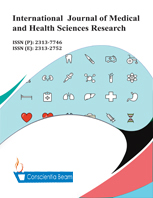Free Maternal and Child Health Services in Enugu State, South East Nigeria: Experiences of the Community and Health Care Providers
DOI:
https://doi.org/10.18488/journal.9/2015.2.9/9.9.158.170Abstract
Enugu State, South East Nigeria launched free maternal and child health services in 2007 against the backdrop of high infant and maternal mortality rates in the State. This study determined the experiences and the perceptions of the community and health care providers on the free maternal and child health services. This was a cross sectional descriptive study carried out in Enugu state Southeast Nigeria. Pre-tested interviewer-administered questionnaire survey with 50 healthcare providers at health centers and 150 women of reproductive age were used to elicit information on the awareness, attitude, utilization and factors affecting utilization of MCH services, satisfaction with and willingness to continue use of these services. In addition, service data from the first health center to benefit from free MCH services was collected from 2007 to 2009. Among the women, there was a high level of awareness of the free MCH services. Antenatal (55.3%), maternal tetanus toxoid immunization (47.3%) and childhood immunization (44%) services were the most accessed. Factors likely to affect the intention to use the services were required services not rendered, drugs not available, delayed attention and distance to the health facility. There was a high willingness to continue use of maternal and child health services due to the free services, easy accessibility and availability of drugs. However, a fifth of the respondents paid for the free services. The service data showed an upward increase in utilization between 2007 and 2009. Although the health workers were receptive of the free MCH services, they opined that their workload had increased without any corresponding increase in their remuneration and that patients were making unnecessary visits to the health facilities to demand on drugs. There was a significant increase in MCH services utilization between 2007 and 2009. Conclusion: This study shows that the free MCH services have enhanced utilization of health services. However this has greatly increased the workload of health providers and consumers still pay for services. There is need therefore for provision of adequate personnel and infrastructure to cater for this increase. In the interim there should be better remuneration of health workers to motivate them to continue providing health services despite the workload. There is also need to check the reported over visitation of health centers for drugs created by the free MCH services and mechanisms should be put in place to ensure that the free services are really free.

